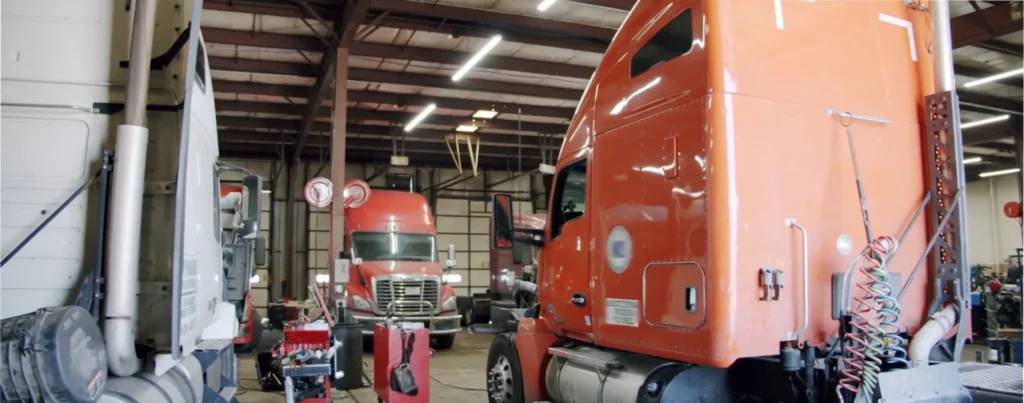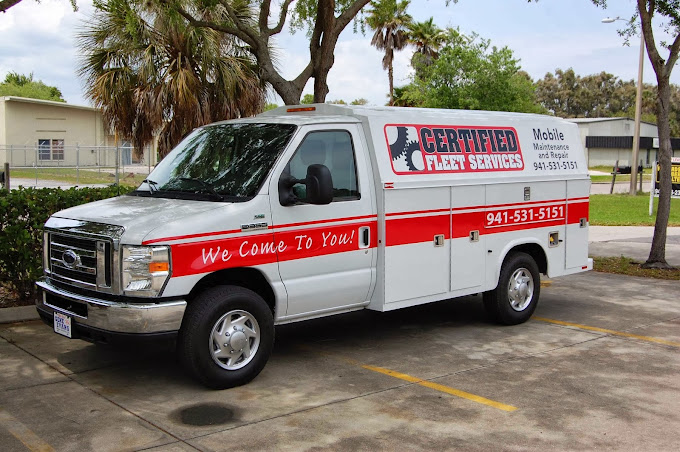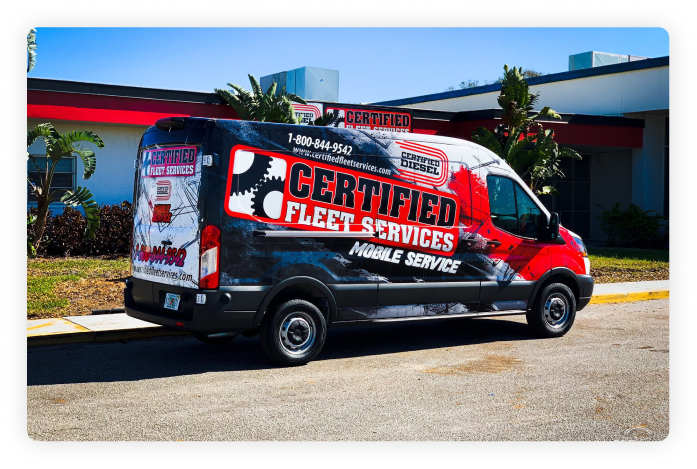A management team is the guardrails that hold a team together. And when managing a fleet of vehicles, you best believe you better have a strong vehicle fleet management strategy. But what exactly is vehicle fleet management?
And what are the benefits of having a strong vehicle fleet management operation?
If you’re wondering what vehicle fleet management is — or where to start to build a winning fleet management operation — you’ve come to the right place.
Certified Fleet Services here. In this article, we’ll discuss essential processes and tasks that vehicle fleet management can help streamline and strengthen.
Grab your favorite beverage and notetaking device, because this is all about vehicle fleet management and how it can help you and your business thrive.
What does vehicle fleet management entail?
Before we dive into the nitty gritty of fleet management, we have to understand what fleet management for vehicles includes. Vehicle fleet management includes a series of complex tasks that keep a business’ transportation of vehicles productive and profitable.
What’s more, vehicle fleet management includes buying new vehicles and ridding of other vehicles, implementing and tracking preventive maintenance (PM) schedules, and tracking vehicles while on and off the road. Technical details are also important in vehicle fleet management.
Fuel usage, maintaining the appearance of vehicles, and handling vehicle compliance are all under the purview of vehicle fleet managers. When the above-mentioned items are accounted for by a fleet manager, fleet managers can enjoy benefits such as reduced operation costs, safer fleet drivers, and happier customers.
But know that these tasks take time and energy. Vehicle fleet managers are responsible for executing heavy administrative tasks and upholding proper fleet management strategies, obtaining comprehensive knowledge of the automotive industry, and outsourcing tasks to relevant fleet management partners.
What processes vehicle fleet management helps support
“So, how can vehicle fleet management benefit me?” You might be wondering. Vehicle fleet management helps fleet managers implement strategies that help managers maintain their fleet’s operations.
For example, proper vehicle fleet management can help with the following:
- Keeping accurate records of the company’s affairs: whether recording vehicle maintenance logs, fuel costs, licensing expiration dates, or leasing contracts, keeping a centralized location of records will help increase efficiency and accuracy throughout fleet operations.
- Risk assessments: Using driver vehicle inspection reports (DVIRs) to monitor vehicle health and data can improve driver safety and security. What’s more, risk assessment includes maintaining regular corrective and preventive maintenance to track that vehicles undergo recommended maintenance at regular intervals.
- Data analysis: Given that vehicle fleet management helps with accurate record-keeping and risk management, fleet managers can analyze data to help brainstorm solutions that benefit the fleet.
- Compliance with local and federal authorities: A strong fleet management program can help managers create a more organized fleet. When fleet-related paperwork — like licensing, insurance policies, driver logs, registrations, and more — are in one location, they’re easier to present to federal authorities. Doing so will streamline communications and interactions with regulatory bodies.
Between fleet maintenance and fleet operations, fleet managers have a great deal on their plate. A winning commercial fleet management program can help reduce costs, improve customer service, and improve fleet operations.
Essential vehicle fleet management tasks
Key to most vehicle fleet management plans are the following essential tasks:
- Ensuring driver safety
- Purchasing new fleet vehicles
- Managing the cost and acquisition of fuel
- Monitoring data to drive performance outcomes
- Managing tolls and other compliance-related issues
We’ll dive into each of these in greater detail in the next sections.
Ensuring driver safety
Part of a fleet manager’s job is to ensure the safety of both their drivers and other drivers. To do so, fleet managers need to be able to analyze driver performance, address risky driving behaviors, and resolve job-related accidents.
What’s more, fleet managers are also responsible for the following:
- Help drivers avoid accidents when possible.
- Identify common accident types.
- Identify individuals who are involved in accidents.
- Change routes based on the time of day and specific locations.
- Hold training for drivers to reduce job-related accidents.
Acquiring new vehicles
Also, fleet managers are responsible for sourcing the right vehicles for the right job. As such, fleet managers’ duties include:
- Finding the right vehicle for the job. Fleet managers should be aware of the weight the vehicle will carry, the conditions in which the vehicle will navigate, and who will drive the vehicle.
- Work with original equipment manufacturers (OEMs), dealerships, and fleet management companies to purchase the right vehicle for the job.
- Negotiate with relevant parties to find the right price for the job.
- If needed, develop and execute a plan for purchasing the vehicle.
- Secure a finance contract for the vehicle.
- Customizing the vehicle (and its branding) according to the job it will perform.
- Registering the vehicle
- Coordinating and executing the purchase and delivery of the vehicle to its final destination.
Fuel management
Fuel management is near the top of most fleet manager’s lists of expenses. A fleet manager is responsible for helping control the costs of fuel.
The best way to understand how to keep fuel costs in check is through accurate and responsible data reviews. Whether managing a profound fuel network or card program, fleet managers must negotiate affordable fuel prices from suppliers.
Doing so helps keep the cost of fleet fuel low.
Data monitoring for more optimal performance
In the 21st century, telematics is becoming more of a necessity than a luxury for vehicle fleets.
With that being said, telematics can help a fleet team better monitor vehicles that are in disrepair or on the road. Data monitoring can also help fleet teams measure how a vehicle performs while it idles, brakes, or uses fuel.
A proper fleet tracking system can offer teams the opportunity to streamline processes, centralize data, present information, and use information for the well-being of the fleet.
Preventive maintenance, tolls, and compliance management
Unplanned downtime, legislation changes, new regulations and toll costs: a fleet manager is responsible for these ever-changing aspects of fleet management.
If systems aren’t in place to ensure preventive maintenance is conducted on a regular schedule — and if systems aren’t in place for tolls to be paid on time — a fleet team can find themselves in hot water with federal authorities and/or customers.
As such, preventive maintenance, proper toll payments, and staying compliant with federal authorities are key to keeping drivers on the road, on-time, and in compliance with authorities.
To help drivers deliver products on time and in good health, fleet managers are responsible for tasks, such as (but not limited to):
- Troubleshooting and providing roadside support to drivers
- Creating and enforcing schedules for preventive maintenance
- Reviewing and approving quotes
- Coordinating payments for goods
- Ensuring DOT inspections are completed on time and as scheduled
- Monitoring fleet-related data related to ensure a more efficient and healthy fleet operation
Mechanic Mythbusters: Certified facts about trucks
❌Myth: Oil changes can wait 50,000 miles. ✅Fact: Diesel engines need regular care to stay efficient.
❌Myth: Minor air leaks don’t matter. ✅Fact: Leaks can destroy your air system.
When the time comes to assess your vehicle fleet management strategy, facts matter. When it comes to truck maintenance, facts matter.
Keep your fleet running on real-world wisdom, not hearsay or rumors. For more real-life facts to help you IRL, visit our Instagram page here.
Better vehicle fleet management begins with Certified fleet experts
Vehicle fleet management refers to strategies, processes, and actions that help keep a fleet operation working and making money. Staying compliant with local authorities, conducting preventive maintenance, analyzing fleet data, and using said fleet data to make better decisions for a company are what vehicle fleet management is all about.
What’s more, vehicle fleet managers often have a ton on their plate.
Fleet managers are often tasked with acquiring new vehicles, managing fuel, managing expenses, ensuring driver safety, and ensuring customer satisfaction. But, having the right partners can make creating and executing a vehicle fleet management strategy a breeze.
That’s where we come in.
At Certified Fleet Services, we’re here to help you grow your fleet and business, one day at a time, one vehicle at a time. For more than 25 years, our ASE-certified mechanics have helped repair fleet vehicles and deliver world-class vehicle fleet management consulting to small and large fleets across the Sunshine State.
Our mission is to get you back on the road faster so you can do what you do best, better and stronger than before.
If you’re looking for support with the management of your fleet — or need repairs with your fleet vehicles — don’t hesitate to reach out. We’d be happy to help you with all your vehicle fleet management needs.
Certified Fleet Services: Getting You Back on the Road Faster













